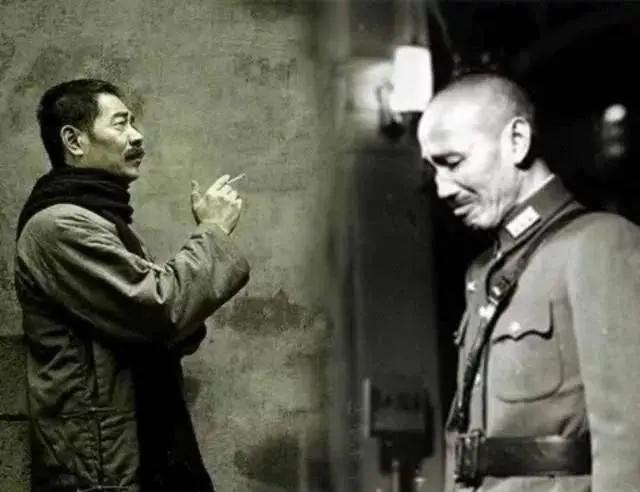Lu Xun cursed countless people in his life, but he never criticized Old Jiang, and after his death, Old Jiang evaluated him with 6 words
As we all know, Lu Xun was jealous and hateful all his life, and countless people were scolded by him, and they covered various fields such as politics, military circles, and academic circles, but what is little known is that in Lu Xun's life, he never scolded the old Jiang, the biggest reactionary at that time, and did not even have a word of criticism.

Speaking of which, Lu Xun and Lao Jiang also have quite a relationship, the two people are Fellows of Zhejiang, one is Shaoxing, the other is Fenghua, and both have the experience of studying in Japan. In modern history, the two people are absolutely the most famous and influential Zhejiang people.
It is worth mentioning that the two people have never had direct contact, and even for a long time, Lu Xun unilaterally pinned his good expectations, and in his letter to Xu Guangping, he mentioned Chiang Kai-shek's name twice, and he was full of expectations.
In August 1926, Lu Xun went south to Xiamen University to teach, and soon received a telegram from Zhu Jiahua, who was then presiding over the affairs of Guangzhou Zhongshan University and a Prominent Kuomintang official, inviting him to Go to Sun Yat-sen University.
As soon as Lu Xun arrived in Guangzhou, he was warmly welcomed by all parties, and at the welcome meeting of CUHK, Zhu Jiahua honored Lu Xun as a "fighter and revolutionary."
Lu Xun's invitation to some bureaucrats and politicians had never been to the banquet, but he did not refuse the invitation to Zhu Jiahua, who was particularly close to Chiang Kai-shek and had a history of "fighting together" in Beijing.
Not only that, during this time, Lu Xun and Kong Xiangxi, the brother-in-law of old Jiang, also had a very good relationship and had close contacts.
At the opening ceremony of Sun Yat-sen University on March 1, 1927, Kong Xiangxi attended the meeting on behalf of the Revolutionary Government of Guangzhou, and Lu Xun met Kong for the first time. On March 29, the two were invited to Lingnan University. After that, Lu Xun went to Kong Xiangxi's apartment to "sit down".
However, this good interaction ended with chiang kai-shek's "April 12" coup d'état and the wanton massacre of workers and peasants.
After that, Lu Xun rushed to Shanghai, gradually drifting away from the Kuomintang regime, and even in the same situation, many of his essays pointed to the Kuomintang authorities, but he never criticized Lao Jiang by name.
In May 1930, some people wanted Lu Xun to "write an article under Zhou Shuren's real name and scold Chiang Kai-shek." ”
Lu Xun immediately refused: "As soon as I published an article under my real name, I could not live in Shanghai, and I could only go to a foreign country to work as a yugong." ”
Some people believe that Lu Xun's failure to scold Chiang Kai-shek shows that he is slippery, old and sophisticated, and not brave enough. Some people also mentioned that Lu Xun received a subsidy from the National Government University College as a special writer, and ridiculed others as grass on the wall and stepped on two boats.
In some people's minds, the most direct criterion for so-called bravery is to challenge authority. From children to adults, it's better.
You may wish to read a small story: in elementary school, two students are bolder than each other, often use the method of daring to scold the class teacher, and whose behavior is the most out of line proves who has the greatest courage. But such boldness is often falsified. A male classmate once threw a stone at the back of the class teacher, but the next day when he was injected with vaccinations, he actually cried in front of the needles.
This matter can be compared to Lu Xun's scolding of Chiang Kai-shek:
First of all, there are many ways to prove a person's bravery, and scolding the class teacher or Chiang Kai-shek is only one of the extremes;
Second, even if you dare to scold the class teacher or Chiang Kai-shek, you may not be able to prove that this is a real brave, and the extreme way lacks stability. Just as extreme ideas lack rationality;
Moreover, courage is not manifested in criticism, but in construction;
In the end, scolding or not scolding is a person's freedom, and when the freedom of silence is taken away and criticism becomes a kind of compulsion, then no matter what choice Lu Xun makes, it has no meaning.
At that time, some people asked Lu Xun to scold old Jiang out of the need for struggle. Nowadays, when this matter is mentioned again, most of them belong to seeking perfection and blaming people with great righteousness. When we talk about Lu Xun, we often put the burden of a country and the mission of an era on his shoulders, and we must have both great benevolence and great righteousness, and we must have both great wisdom and courage. As everyone knows, the facts are a dilemma.
When some people make accusations and lash out at the Internet, they do not know that in real life, they dare not point it out when they see thieves on the bus. Of course, it's a bit far-fetched.
Speaking of which, the standard of a fighter is not only one, Lu Xun scolded or did not scold Old Jiang, it will not affect his critical spirit and brave demeanor.
In October 1936, Lu Xun died of illness, in order to commemorate him, Lao Jiang personally wrote an inscription for him: Mr. Lu Xun has been ancient! It can be seen that there is a reason for Lu Xun's righteous words, and his talent is enough to impress many people.